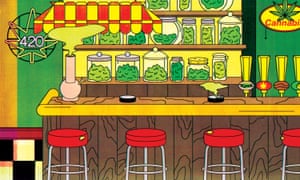Recreational marijuana is legal in Canada and parts of the US, but for the most part it’s not allowed in public spaces

With
recreational marijuana legal in 10 US states and Canada, tens of
millions of adults can go to a store and buy a joint. But outside their
homes, there are few places where those customers can legally smoke it.
Clouds of pot smoke float around North America’s biggest cities, but for the most part it’s not allowed in public spaces, and there hasn’t been a profusion of Amsterdam-style coffee shops or other businesses where someone can consume a legal drug.
But that could be changing.
Denver’s first legal consumption lounge, The Coffee Joint, opened last year. Its co-owner Rita Tsalyuk described it as a “Starbucks on steroids”. It costs $5 to enter if you plan to consume – though entrance is otherwise free – and while the shop itself can’t sell cannabis, it’s attached to a licensed dispensary. The space hosts video game and movie nights, singles mixers, yoga and industry events.
On a busy day about 50 people come in. That’s not Starbucks traffic,
and Tsalyuk said consumption lounges would struggle to stay open unless
they find more revenue streams, like selling cannabis or alcohol. Bars
in Denver and elsewhere have also expressed interest in selling
cannabis, but so far, at least, establishments selling both intoxicants
are hard to find. One entrepreneur hoped to open a cannabis spa in
Denver but her proposed location was deemed too close to a school.Clouds of pot smoke float around North America’s biggest cities, but for the most part it’s not allowed in public spaces, and there hasn’t been a profusion of Amsterdam-style coffee shops or other businesses where someone can consume a legal drug.
But that could be changing.
Denver’s first legal consumption lounge, The Coffee Joint, opened last year. Its co-owner Rita Tsalyuk described it as a “Starbucks on steroids”. It costs $5 to enter if you plan to consume – though entrance is otherwise free – and while the shop itself can’t sell cannabis, it’s attached to a licensed dispensary. The space hosts video game and movie nights, singles mixers, yoga and industry events.
In legal cities one can also find gray-market shops where it’s possible for customers to bring their own cannabis, relax on couches, watch TV or have a cup of coffee. It’s a nice idea, but without the ability to sell cannabis, they can struggle to survive as a business, even if they avoid getting shut down by police.
Samantha Montanaro, a cannabis entrepreneur and activist who’s pushing for social use in Oregon, calls for “freedom to choose what you want to consume”. She acknowledged cannabis lounges were a “tough business” since they appeal to backpacking tourists with little spare cash as well as lower-income people who live in federally subsidized housing where marijuana isn’t allowed. If customers can’t buy cannabis, they’re likely to bring their own and hang out all day.
Montanaro sees more of a business opportunity in hosting private consumption tastings and dinners. “Cannabis goes with everything so pairing it with already thriving markets is a good way to go,” she said.
Lisa Snyder, who cofounded Tokeativity, a cannabis community for women with Montanaro, said the “new normal will be events where there’s no alcohol and everyone is really excited about that”.
Indeed, “social use” may be about to have its moment. In San Francisco, a Market Street spot called Moe Greens opened a few weeks ago. It sells cannabis and offers separate rooms for vaping, smoking and concentrates, all in a stylish mid-century modern building. But not many cities have San Francisco’s concentration of young tech millionaires with time to ponder their next start-up idea.
By the end of 2019 there could be eight or nine cannabis lounges in West Hollywood, California, which would amount to roughly as many as there currently are in the rest of the country. It seems likely that with time, the rules surrounding social use will loosen and businesses will figure out a way to appeal to appeal to both affluent and impoverished customers.
For a great many cannabis users, the lack of social use opportunities is a minor inconvenience, at worst. But as someone who pays close attention to legalization, I wish there were more of them.
Even in cities where cannabis is legal, alcohol still largely sets the tone for nightlife. The equivalent of cannabis bars might make it easier to determine who is using cannabis and in what context.
A room full of cannabis users looks different, sounds different and certainly smells different from a bar.
Even walking by one would give people more of a sense of the drug’s social context and how it makes people behave. Having those rooms open to public view would allow people to make up their minds about whether legalization is an experiment worth pursuing.

No comments:
Post a Comment